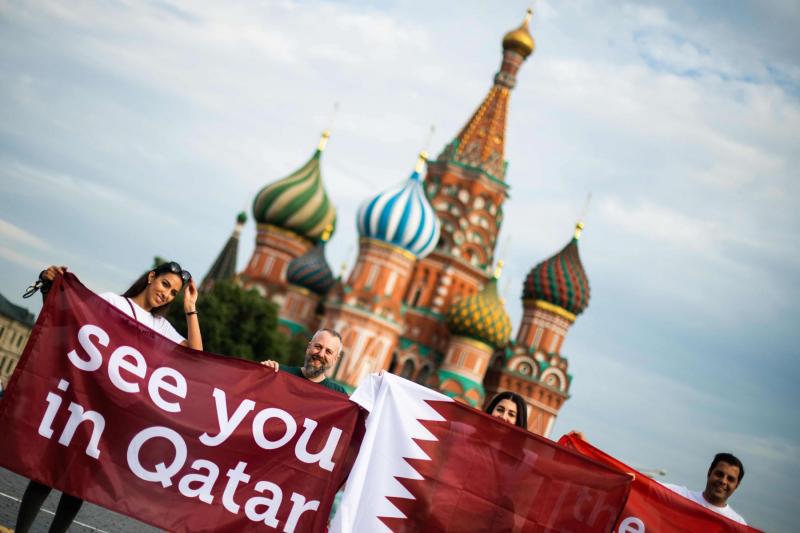A failed winter cup will do no good to Qatar’s reputation
As pressure mounts on Qatar over its hosting of the 2022 FIFA World Cup, many say that, even if the tournament goes ahead as planned, it is unlikely to be the public relations coup Doha envisioned in 2010 when it was awarded the tournament.
“Russia was brilliant,” said English football fan Jamie Kinsella. “The fan zones were great. The people were welcoming and the authorities were well-organised and friendly.”
Questions remain as to whether Qatar can replicate the experience, particularly with the tournament confirmed for the winter, starting November 21 and ending December 18, due to the extreme heat in Qatar during the summer.
“What a shame,” tweeted British radio presenter Steve Penk. “Part of the joy of the World Cup is enjoying the game at fan zones in the summer in parks, etc. Simply won’t be the same in icy cold November and December. Qatar should never have been given the World Cup when it’s too hot in traditional World Cup months. Crazy.”
There are not only questions about World Cup fan zones abroad but also the areas Qatar intends to set up to accommodate the millions who travel to watch the tournament live or at last be close to the action on the pitch.
Russia’s World Cup fan zones welcomed some 7.7 million visitors during the tournament, 2.5 million more than the 2014 World Cup in Brazil.
With about four years until the tournament, it is not clear how many fans Qatar’s fan zones will be able to accommodate, although the figure of 1.3 million — half of the country’s total population — has been quoted in the official media.
It is also not clear how many teams will be participating at the 2022 World Cup because FIFA is keen to expand the competition from 32 teams to 48, which would necessitate even more facilities to accommodate fans.
Qatar has said that it would allow the sale of alcohol in fan zones but many worry that alcohol will not be sold in the stadiums themselves, a major break with World Cup tradition. Many fans expressed trepidation about what else they will be able to do and see in Qatar when not watching football.
“In Russia, we visited Lenin’s Mausoleum and the Red Square in Moscow. We saw the Winter Palace in St Petersburg. There were loads of great restaurants and bars. There was lots to do beside football,” said Kinsella.
The worry is that Qatar will see foreign visitors corralled in tightly restricted fan zones with not much to do in between the matches. There are questions about policing in the conservative Muslim country and whether it will stretch to accommodate people from disparate cultures.
There had been similar concerns about Russia’s police force, not exactly known for its openness and tolerance but Russian police evidently received the word from on high to adhere to a more liberal attitude during the World Cup and millions of South American fans faced no problem openly marching, chanting and drinking into the early hours of the morning on the streets of small regional towns such as Saransk, east of Moscow. Many doubt similar scenes will be possible in Qatar, even if Doha does rely on foreign police forces, as it has pledged to do.
The 2022 World Cup, if held by Qatar, is something that will likely not just irritate football fans who make the Qatari journey but also those watching at home. European leagues will see their 2022-23 seasons split in half by the World Cup, something that has angered football associations and required renegotiation with TV networks and sponsors. The English Premier League described the idea of a winter World Cup as “unworkable and unacceptable to domestic European football.” Similar comments have been made by other leagues and officials.
A winter World Cup will clash with the NFL in the United States and set up a choice for American sport fans. Fox paid a record $424 million for the rights to broadcast the 2018 and 2022 World Cups under the assumption that the tournaments would form a major part of its summer schedules. With the next World Cup slated for the winter months, this puts a major crimp on Fox’s plans, and many other TV networks find themselves in the same boat.
“I don’t understand why they’re making all of these changes,” Kinsella said. “We’re all used to World Cups being in the summer. Why are we making all of these changes just to accommodate one country?”
Qatar, like Russia, is betting that the World Cup will promote a positive image of the country across the world but a failed winter World Cup could do more harm than good.
Mahmud el-Shafey is an Arab Weekly correspondent in London. You can follow him on twitter @mahmudelshafey
This article was originally published in The Arab Weekly.







